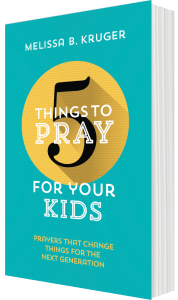This post first appeared on The Good Book blog; used with permission.
The following piece is an extract from 5 Things to Pray for Your Kids by Melissa Kruger. In the book Melissa suggests fresh, biblical ideas to help you pray for tots, teens and all ages between. Today we wanted to give you a sneak peek at what the book looks like. This chapter uses psalm 121 to help you pray for God’s care of your child…
Father, I pray that you will help my child by…
1. Encouraging me
“I lift up my eyes to the mountains—where does my help come from? My help comes from the LORD” (Psalm 121 v 1).
Being a parent is a wonderful gift, but it is also difficult. There’s no owner’s manual to guide us in all the choices we face each day. Praise God that we can turn to him for the help we need! Pray that he will guide your steps and lead you as you parent today.
2. Watching over them
“He who watches over you will not slumber; indeed, he who watches over Israel will neither slumber nor sleep” (Psalm 121 v 3-4).
As parents, we are limited. Even with modern technology, we can’t watch our children at every moment (although we certainly try!). Thank God that he is always watching over them, and that he never slumbers or sleeps. Pray that your child will know God is with them, no matter where they go or what they face.
3. Providing refreshment
“ The LORD is your shade at your right hand; the sun will not harm you by day, nor the moon by night” (Psalm 121 v 5-6).
We all need a place of refuge. The world can be difficult and lonely. Pray that when life is hard for your child—when they experience a broken heart, a difficult illness, or a painful consequence—they will turn to the Lord and find comfort in him.
4. Keeping them from harm
“The LORD will keep you from all harm—he will watch over your life” (Psalm 121 v 7).
While we want to keep our children safe, we know we are often powerless to protect them from skinned knees, harmful gossip, and their own mistakes. Pray that the Lord will use the trials they endure to draw them closer to himself, and that he will keep them from all that he sees is harmful.
5. Protecting their future
“ The LORD will watch over your coming and going both now and forevermore” (Psalm 121 v 8).
Our children make choices each day. As they grow, these choices increase in significance. Pray that the Lord would guide your child in the future as they choose what to study, which church to be part of, who to marry, or what job to pursue.
About the Author:
Melissa Kruger is the author of Wherever You Go, I Want You to Know as well as several books for adults. She blogs at Wit’s End, hosted by The Gospel Coalition. Her husband, Mike, is the president of Reformed Theological Seminary, and they have three children.
 5 Things to Pray for Your Kids
5 Things to Pray for Your Kids
Our culture says that the most important things for children are education, good health, treats, entertainment, and material things.
Yet as Christians, we know that children’s spiritual health is the most important thing. So we need to pray for them, but where do we start?
This little guide is both deep and easy to use. Melissa Kruger takes us back to the Bible to show us what God’s will for children is, so we can pray in line with it.
She selects 21 key areas of spiritual growth and character development. For each one, there are five short prayer prompts drawn straight from the Bible.



